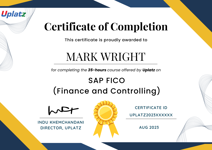
Chief Risk Officer (CRO) Premium Career Track
Program consisting of courses to help you fulfil your dream of becoming a C-Level Executive (CRO) in a top organization
Uplatz
Summary
- Uplatz Certificate of Completion - Free
Add to basket or enquire
Overview
Uplatz provides this intense Premium Career Track program on Chief Risk Officer (CRO). It is a program covering all topics related to Risk, as self-paced video lectures. The program will help you pursue a career towards becoming a CRO. You will be awarded Course Completion Certificate at the end of the course.
This Premium Career Track - Chief Risk Officer (CRO) program by Uplatz includes the following courses:
- CISSP (Cybersecurity)
- SAP GRC (Governance, Risk and Compliance)
- SAP TRM (Treasury and Risk Management)
- SAP S/4HANA TRM
- SAP MDG (Master Data Governance)
- Business Finance & Financial Modeling
- Financial Accounting & Reporting
- Cost & Management Accounting
- Leadership and Management
This Chief Risk Officer Career Path course is designed to provide CROs with the information and skills they need to excel in their present roles and further their risk management careers.
The Chief Risk Officer is a C-suite executive who is tasked with the identification, analysis, and mitigation of events that could threaten a company. These risks could be internal or external in nature.
A chief risk officer is a corporate executive responsible for identifying, analyzing, and mitigating internal and external risks. The chief risk officer works to ensure that the company complies with government regulations, such as Sarbanes-Oxley, and reviews factors that could hurt investments or a company's business units. In business, risk is unavoidable; CROs that can see the larger picture will help their companies survive in a risky climate. The Chief Risk Officer (CRO) Program is designed to help you learn the principles of contemporary and strategic risk management at the senior level. You'll discover how risk management should be established and structured - both conceptually and functionally - so that a Chief Risk Officer can give their colleagues, CEO, and board the best possible assistance.
CROs typically have post-graduate education with more than 20 years of experience in accounting, economics, legal, or actuarial backgrounds. They are also referred to as chief risk management officers (CRMOs).
Risks CROs must watch for:
The types of threats the CRO usually keeps watch for can be grouped into regulatory, competitive, and technical categories. As noted, companies must ensure they are in compliance with regulatory rules and fulfilling their obligations on reporting accurately to government agencies.
CROs must also check for procedural issues within their companies that may create exposure to a threat or liability. For example, if a company handles sensitive data from a third party, such as personal health information, there may be layers of security that the company is required to maintain to ensure that data is kept confidential. If there are lapses in that security—such as when an employee allows an unauthorized person, even within the company, to have access to a company computer that contains such data—it can be a form of exposure that a CRO must address. Unauthorized access to sensitive data may also constitute a competitive risk if there is the potential for rival organizations to use such information to take away clients or otherwise damage the public image of the company.
- Developing risk maps and formulating strategic action plans to help minimize, manage, and mitigate primary risks and then monitor the progress of these efforts.
- Creating and disseminating risk analysis reports and progress reports to different stakeholders, including employees, board members, and C-suite executives.
- Ensuring that risk management priorities are reflected in the company's strategic plans.
Formulating and implementing risk assurance strategies that are related to the transmission, storage, and use of information and data systems. - Evaluating possible operational risks that may arise from human error or system failures, which might disrupt or affect business processes. The CRO also develops different strategies to minimize risk exposure and designates appropriate responses for when human errors or system failures occur.
- Measuring the organization's risk appetite, and setting the amount of risk that the organization is able – and willing – to take on.
- Developing budgets for risk-related projects and supervising their funding.
- Conducting risk assurance and due diligence on behalf of the organization in the events of mergers, acquisitions, and business deals.
Course media
Description
Skills of a Chief Risk Officer
Here's a list of common skills that are shared by CROs:
Analytical skills: Chief risk officers can use analytical skills to evaluate risks and develop strategies to mitigate risks for a company.
Problem-solving skills: Skills in problem-solving and negotiation can help a chief risk officer find solutions to manage a business's risks.
Leadership skills: A chief risk officer can use leadership skills to help guide companies to regulatory compliance and proper data security practices.
Communication skills: Chief risk officers can communicate with a company's executives, managers and employees of different levels, so communication skills are important in this role. Communication skills can also help chief risk officers manage employees.
Presentation skills: Chief risk officers can create and make presentations for a company's executives and shareholders, so presentation and public speaking skills are an asset in this role.
Time management skills: Time management skills can help a chief risk officer work under pressure.
Chief Risk Officer Responsibilities
A CRO leads efforts to reduce business risks that can put an organization's profitability and productivity at risk. They also spearhead efforts related to enterprise risk management.
A Chief Risk Officer is responsible for implementing policies and procedures to minimize or manage operational risks. They are also tasked with coming up with mitigating processes to help minimize or avoid losses that may arise when the systems, procedures, or policies in place are found to be inadequate – or if they fail entirely.
A CRO must manage compliance with regulatory requirements on a federal, state, and local level. They are also concerned with other security-related issues, including IT security, internal auditing, financial auditing, insurance, fraud prevention, global business climate changes, and similar corporate internal investigations. They may also become involved with disaster recovery and business continuity planning.
As one would guess, the responsibilities of a Chief Risk Officer largely depend on an organization’s size as well as its industry. The CRO is responsible for all risk management strategies and operations, as well as supervising the organization's risk mitigation and identification procedures.
In recent years, IT has become a big part of every business and naturally, the CRO needs to address the risks associated with data breaches and hackers. As such, the CRO is also concerned with risk assurance and data protection and has a hand in stamping out system vulnerabilities and other threats.
The CRO is responsible for identifying and assessing risks, and then developing modules and treatments to combat or minimize these risks. A successful risk manager has the analytical skills, quantification skills, and requisite expertise to do all these.
A Chief Risk Officer must also have outstanding people skills in order to properly educate employees and key personnel about risk while also facilitating dialogue and communication among different departments or groups of people.
What does a chief risk officer do?
A chief risk officer evaluates a company’s risk by monitoring regulatory, technical and competitive factors. CROs report to their company's CEO or board of directors. The day-to-day risk management duties for a CRO include determining and evaluating a company’s risk tolerance, creating strategic plans to mitigate risk and generating reports on a company’s risks and risk management initiatives and distributing them to employees, executives and stakeholders.
Here are the main types of risks a chief risk officer mitigates:
Technical risks: A CRO ensures that its company is protected from technical risks such as cyber-attacks that may reveal sensitive information.
Regulatory risks: A CRO ensures that their company is in compliance with all rules, laws and regulations concerning their industry.
Competitive risks: A CRO mitigates any risks presented by competition and ensures that their company’s brand remains positive in the marketplace.
Strategic Risk – To reach their business goals, organizations must effectively execute on their strategic objectives. Strategic risks are those that limit the organization’s ability to execute its core business model successfully in the marketplace.
Operational Risk – Operational risks are the uncertainties that stem from the possibility of internal process failure. Business interruptions, litigation, loss of key individuals or knowledge, vendor turnover, and IT failures are all operational risks.
Reputational Risk – Reputational risks threaten the organization’s brand, image, and good standing within the community. Negative publicity,
Compliance Risk – Regulatory compliance is paramount for all organizations but especially those who operate in highly regulated industries like finance and healthcare. Organizations who fail to meet compliance requirements can face legal penalties, costly fines, and reputational damage.
What is the salary for a chief risk officer?
The average base salary for a chief risk officer is $140,000 per annum. Many factors may affect this salary, including industry, size of the company and geographic location. For the most up-to-date information from Indeed, please click on the salary link above.
Qualifications for a chief risk officer
Here’s how to become a CRO:
1. Earn a bachelor's degree
The first qualification is a bachelor's degree in finance, business, accounting, statistics or a related subject.
2. Gain experience
Most chief risk officers have more than 20 years of experience in business or finance before being promoted to their positions. Here are some job titles that can give you the experience to manage risks for companies:
Auditor
Accountant
Investment Advisor
Risk Manager
3. Obtain licenses and certifications
Certifications can help you gain valuable knowledge. The following licenses and certifications are common among chief risk officers:
Regulatory license
Valuation analyst certification
Financial analyst certification
Sustainability accounting credential
Auditing certification
4. Earn a master's degree
Most CROs earn a master's degree in business, economics, finance or a related field to gain a deeper understanding of risk management principles and strategies. A Master's of Business Administration, for example, can give you the industry and economic knowledge necessary for a CRO career path.
5. Grow your network
As you gain experience make sure to attend conferences and conventions, and join professional organizations related to your industry. It’s important to form and nurture business relationships with others on your career path.
Chief Risk Officers are becoming increasingly commonplace among modern enterprises as the risk landscape grows ever-more complex. Having a single, highly qualified risk management professional to oversee efforts to reduce and mitigate risks is invaluable to a company’s overall security posture.
Who is this course for?
Everyone
Requirements
Passion and determination to make it to the top of the corporate ladder!
Career path
- Chief Risk Officer (CRO)
- Chief Strategy Officer (CSO)
- Chief Executive Officer (CEO)
- Chief Operating Officer (COO)
- Chief Financial Officer (CFO)
- Auditor
- Investment Advisor
- Risk Manager
- Project Manager
Questions and answers
Currently there are no Q&As for this course. Be the first to ask a question.
Certificates
Uplatz Certificate of Completion
Digital certificate - Included
Course Completion Certificate by Uplatz
Reviews
Currently there are no reviews for this course. Be the first to leave a review.
Legal information
This course is advertised on reed.co.uk by the Course Provider, whose terms and conditions apply. Purchases are made directly from the Course Provider, and as such, content and materials are supplied by the Course Provider directly. Reed is acting as agent and not reseller in relation to this course. Reed's only responsibility is to facilitate your payment for the course. It is your responsibility to review and agree to the Course Provider's terms and conditions and satisfy yourself as to the suitability of the course you intend to purchase. Reed will not have any responsibility for the content of the course and/or associated materials.



